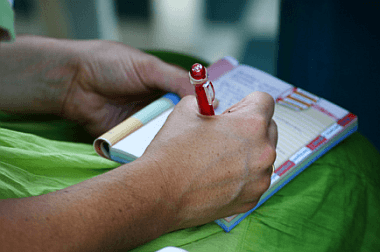Since high school, I’ve relied on notebooks (my current preference is Moleskine cahiers, though I’ve used everything from composition books to huge 200-page sketchbooks to little spiral bounds obtained at the dollar store) to write down anything that came up during the day. I eventually adapted to interpreting this information into a planner and then an online calendar. These days, productivity experts such as David Allen, call such a system “ubiquitous capture.” My grandmother used plainer language and told me that if I didn’t write things down, my thoughts would wander off without me. She was entirely right. A notebook is useful in the moment — it’s portable and doesn’t need time to boot up or load software. That doesn’t justify me hanging on to years of shopping lists, though. It’s the other notes that crept in that make these notebooks worthwhile. An article on Dosh Dosh yesterday got me thinking about how these notebooks are effectively my private journals. While they’re full of task lists, I also used these notebooks to record lecture notes, ideas for short stories, long-term goals and just about everything that has gone through my head. We’re talking about uncensored thoughts that often never saw the light of day again. I read through old notebooks when I need ideas or I want to remember what was important to me at a certain time. Maki puts it better: It’s true. Even the act of writing down notes about a story I wanted to write was enough to improve the story. I check through old notebooks regularly for ideas to write about and even to attempt to sell. Any time I experience the slightest twinge of writer’s block, I start reading my own notes. A few days ago, I went looking for notes from a talk I attended during my sophomore year of college. The speaker was Stephanie Elizondo Griest, and she’d spoken about traveling on her own — a woman alone out in the world. Nominally, I’d been taking notes as a precursor to an article I was writing for the student paper, but I’ve pulled out these notes for three or four different occasions, like when a female friend was making solo traveling plans. I hadn’t pulled them out when making my own plans for my time abroad (Ireland and its neighbors didn’t seem quite as dangerous to a gal on her own than Griest’s experiences in rural Latin America), but I see now that I had made side notes about the trip I intended to eventually take. I can follow along with the plans I made, the places I wanted to visit. I can even tell you about my struggles getting my passport into my hands. I’ve got the notes I would need to write any number of articles about visiting Ireland or any short stories about the bureaucracy of travel abroad. While I think that blogs and online journals are incredibly valuable precisely because they are shared, I think that these notes written without intentions of publication have far more value when I look back. They’re the clearest indicators of how I have changed over the years, and what I have thought was important. I know many people think that a formal journal or diary is more worthwhile and a better indicator, but, personally, I could never take that formal of a style when writing to myself. I know that one of the key pieces of advice that many authors copy each other on is that young writers should journal or keep a diary. It’s a standard exercise in creative writing classes of every type: write down your ideas, thoughts, anything that could evolve into a full-fledged piece of writing. And, let me tell you, anything can evolve into a poem or an essay. My notes on PR tactics from senior year were handed in for a poetry class practically verbatim. Despite my internal voice, though, I think that journaling is an admirable pursuit. Beyond the benefits of recording your thoughts for later, I think a daily or even a somewhat regular writing habit is practically necessary to improve a person’s ability to communicate. And don’t forget posterity! People still read Samuel Pepys’ diary and he died in 1703. Any genealogist, amateur or otherwise, will bless your name if you leave a journal — or any other records of your life beyond a carefully emptied inbox. Thinking of starting your own journal? Consider starting small and offline. As simple to use as a free WordPress account (or another online journaling option of your choice), there is a lingering feeling that it might not be as private as one might want. The goal of most journaling is to be able to write without even personal censorship, after all. I’d even argue against using a computer at all — if you want an opportunity to take notes of your thoughts and ideas as they occur, waiting to get back to your desk may not cut it.
